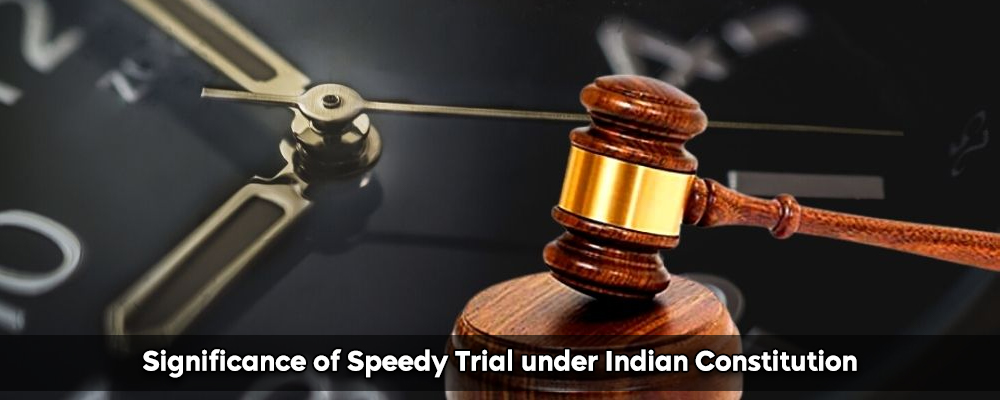Article 21 of the Indian Constitution enshrines the idea of “Speedy Trials” as a fundamental human right, not only as a legal precept. The Indian judiciary has interpreted the article, which ensures the protection of life and individual liberty, to include the right to a prompt trial. In a nation where bottlenecks in the legal system have long been a problem, the spirit of Article 21 acts as a guide to guaranteeing prompt and effective administration of justice.
Article 21: Constitution of India
Under the virtue of Article 21 of the Constitution of India, “No person shall be deprived of their life or personal liberty except pursuant to the procedure established by law.” Even if the article specifically mentions the preservation of life and individual freedom, the Supreme Court of India routinely construes it to include the right to a quick trial. This interpretation’s central tenet is the notion that “justice delayed is justice denied.”
Need A Legal Advice
The internet is not a lawyer and neither are you. Talk to a real lawyer about your legal issue

Right to a Speedy Trial: Indian Constitution
The right to a prompt trial guarantees that criminal suspects are not subjected to protracted periods of uncertainty and apprehension. It also stops people from being wrongfully kept in legal limbo by abusing the legal system. This privilege protects people’s reputations and sense of worth, while also preserving public confidence in the legal system.
For a variety of reasons, the Indian legal system frequently experiences lengthy delays in the course of trial proceedings. These difficulties have been exacerbated by overworked courts, a large backlog of cases, administrative complications, and inefficiencies in the justice delivery system. Trials that drag on have an adverse effect on witnesses, victims, and the accused, who are kept in a state of legal limbo for an extended period of time.
Significance of Speedy Trial
- Speedy trials make sure that people are not the target of excessive harassment or suffering as a result of drawn-out judicial proceedings. This protection is especially important for people who could be innocent or who are charged with non-heinous crimes.
- A legal system’s trust among citizens is increased when justice is delivered promptly. Trials that are completed quickly increase the public’s trust in the ability of the judiciary to uphold the law.
- Swift punishment for crimes has a deterrent effect on potential offenders. A system that guarantees prompt trials can help deter criminal activity.
- Speedy trials preserve the values of justice by avoiding pointless delays that can harm the accused or witnesses. Timely proceedings guarantee that facts and memories are still current.
- The effectiveness of the judiciary’s operation is essential for timely justice. Trials that are completed quickly help clear the backlog of cases and free up court resources.
Role of Judiciary: Kerala High Court
- In the case of Greik Xavier v. Sub Inspector of Police, Respondent-wife filed a criminal complaint against the petitioner-husband in accordance with Section 498A of the IPC. Based on the settlement reached between the parties, the divorce was declared final and all pending legal proceedings were quashed.
- The importance of speedy trials as a representation of Article 21’s substance was reiterated by the Kerala High Court. The court highlighted that access to prompt justice is a fundamental right and essential for preserving individual liberties. The ruling emphasized the state’s obligation to provide a speedy trial process and the detrimental effects of delays on the rights of an individual, confirming the axiom that justice delayed is justice denied.
Conclusion
The Kerala High Court’s declaration that expedited trials are a manifestation of Article 21’s spirit emphasizes how crucial it is to administer justice promptly. The court’s progressive approach, use of technology, and emphasis on marginalized groups serve as a model for a justice system that upholds people’s fundamental rights. The principles established by the Kerala High Court remain a witness to the judiciary’s dedication to preserving justice through the prompt and just adjudication of cases as the legal system of India changes.
Numerous attempts and reforms have been undertaken to solve the issue of slow delivery of justice in India in light of the significance of swift trials. One such approach has been the implementation of fast-track courts, which concentrate on swiftly resolving cases involving serious crimes. The use of technology has also sped up courtroom proceedings. One example is the use of video conferencing to record evidence.
One can talk to lawyer at Lead India for legal assistance. In India, free legal advice online is available at Lead India. Along with obtaining free legal advice online, you can also ask questions to the experts online for free at Lead India.





 Talk to a Lawyer
Talk to a Lawyer